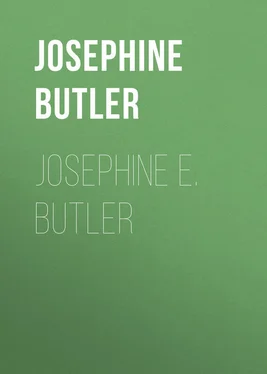Josephine Butler - Josephine E. Butler
Здесь есть возможность читать онлайн «Josephine Butler - Josephine E. Butler» — ознакомительный отрывок электронной книги совершенно бесплатно, а после прочтения отрывка купить полную версию. В некоторых случаях можно слушать аудио, скачать через торрент в формате fb2 и присутствует краткое содержание. Жанр: foreign_antique, foreign_prose, на английском языке. Описание произведения, (предисловие) а так же отзывы посетителей доступны на портале библиотеки ЛибКат.
- Название:Josephine E. Butler
- Автор:
- Жанр:
- Год:неизвестен
- ISBN:нет данных
- Рейтинг книги:5 / 5. Голосов: 1
-
Избранное:Добавить в избранное
- Отзывы:
-
Ваша оценка:
- 100
- 1
- 2
- 3
- 4
- 5
Josephine E. Butler: краткое содержание, описание и аннотация
Предлагаем к чтению аннотацию, описание, краткое содержание или предисловие (зависит от того, что написал сам автор книги «Josephine E. Butler»). Если вы не нашли необходимую информацию о книге — напишите в комментариях, мы постараемся отыскать её.
Josephine E. Butler — читать онлайн ознакомительный отрывок
Ниже представлен текст книги, разбитый по страницам. Система сохранения места последней прочитанной страницы, позволяет с удобством читать онлайн бесплатно книгу «Josephine E. Butler», без необходимости каждый раз заново искать на чём Вы остановились. Поставьте закладку, и сможете в любой момент перейти на страницу, на которой закончили чтение.
Интервал:
Закладка:
A well-known divine came to visit us, and hearing of our poor invalid, kindly offered to see and converse with her. My husband and I agreed that we would say nothing to our friend of Marion’s past life, for we thought that, saintly man though he was, he probably had not faith enough to do justice to her and to himself in the interview if he had this knowledge. (There are few men whose faith comes up to that measure.) When he joined us again downstairs his face was radiant, and he spoke, not of any teaching or comfort which he might have conveyed to her, but of the help and privilege it was to himself to have held communion during a short half hour with a dying saint, so young, yet so enlightened, and so near to God.
I recall the day of her death. It was a cold, snowy day in March. In the morning my husband went to see her early, before going out to his college work. She could scarcely speak, but looking earnestly at him said, as if to reward him for all his painstaking instructions, and guessing what he wished to know, “Yes, God is with me, sir; I have perfect peace.” Her long death-struggle lasting twelve hours, joined with the peace and even joy of her spirit, was very affecting. Though it was bitterly cold, she whispered, “Open the windows, for the love of God.” Her long black hair, thrust wildly back, was like the hair of a swimmer, dripping with water, so heavy were the death-dews. She became blind, and her fine intelligent eyes wandered ever, with an appealing look, to whatever part of the room she thought I was in. Towards sunset she murmured, “Oh, come quickly, Lord Jesus.” During that long day she continually moved her arms like a swimmer, as if she felt herself sinking in deep waters. Then her poor little head fell forward, a long sigh escaped her parted lips, and at last I laid her down flat on her little bed. My husband and sons returned from college, and we all stood round her for a few minutes. She had become a household friend. She looked sweet and solemn then, her head drooping to one side, and with a worn-out look on the young frail face, but a look, too, of perfect peace.
A few days before her death I telegraphed, at her request, to her father, who had had no tidings of his lost child for five years. He was an extensive farmer, well to do and honourable, living in a beautiful district in the midland counties. We were surprised, on his arrival, to see a very fine-looking country gentleman, as one would say, reminding us, in his noble height and figure and dignified presence, a little of my own father. He carried with him a valise and a handsome travelling rug. We took him to her room and retired. Their interview was best witnessed by God alone. After two hours or so I opened the door softly. He was lying on a couch at the opposite side of the room from her in a deep sleep, tired probably more by strong emotion than by his journey. She raised her finger for silence, and with the look and action of a guardian angel whispered, “Father is asleep.”
After her death her poor mother came to attend her funeral. I had filled Marion’s coffin with white camelias, banking them up all round her. With her hands crossed on her breast, and dressed as a bride for her Lord, she looked quite lovely. I found the mother alone, kneeling by the coffin in an agony of grief and of anger. She said (her body rocking backward and forward with emotion), “If that man could but see her now! Can we not send for him?” And she added, “Oh, what a difference there is in English gentlemen’s households! To think that this child should have been ruined in one and saved in another!” Yes, it might have been good for “that man” to have been forced to step down from his high social position and to look upon her then, and to have known the abyss from which she had been drawn, to the verge of which he had led her when she was but a child of fifteen.
Marion had “prophesied” to me, before she died, of hard days and a sad heart which were in store for me in contending against the evil to which she had fallen a victim. I recall her words with wonder and comfort. She would say, “When your soul quails at the sight of the evil, which will increase yet awhile, dear Mrs. Butler, think of me and take courage. God has given me to you, that you may never despair of any.”
Snow lay thickly on the ground when we laid her in her grave in the cemetery. When we came back to the house I was trying to say something comforting to the mother, when she stopped me and said, “My heart is changed about it all. The bitter anger won’t come back, I think; and what has taken it all away was the sight of Mr. Butler standing by the grave of my child, and the words he spoke. Oh, madam,” she said, “when I looked at him standing there in the snow, dressed in his linen robe as white as the snow itself, and with that look on his face when he looked up to heaven and thanked God for my daughter now among the blessed, I could hardly refrain from falling on my knees at his feet, for he seemed to me like one of the angels of God! I felt happy then, almost proud, for my child. Oh, madam, I can never tell you what it was to me to look on your husband’s face then! My heart was bursting with gratitude to God and to him.”
There were others about the same time whom we took home, who died in our own house, and were laid in graves side by side in the cemetery. Of one I have a clear remembrance, a girl of seventeen only, of some natural force of character. Her death was a prolonged hard battle with pain and with bitter memories, lightened by momentary flashes of faint hope. She struggled hard. We were called to her bedside suddenly one evening. She was dying, but with a strong effort she had raised herself to a sitting position. She drew us near to her by the appeal of her earnest eyes, and raising her right hand high with a strangely solemn gesture, and with a look full of heroic and desperate resolve, she said, “ I will fight for my soul through hosts, and hosts, and hosts! ” Her eyes, which seemed to be now looking far off, athwart the hosts of which she spoke, became dim, and she spoke no more. “Poor brave child!” I cried to her, “you will find on the other shore One waiting for you who has fought through all those hosts for you , who will not treat you as man has treated you.” I cannot explain what she meant. I have never been quite able to understand it; but her words dwelt with us – “through hosts, and hosts, and hosts!” She had been trampled under the feet of men as the mire in the streets, had been hustled about from prison to the streets, and from the streets to prison, an orphan, unregarded by any but the vigilant police. From the first day she came to us we noticed in her, notwithstanding, an admirable self-respect, mixed with the full realisation of her misery. And that sense of the dignity and worth of the true self in her – the immortal, inalienable self – found expression in that indomitable resolution of the dying girl: “I will fight for my soul through hosts, and hosts, and hosts!”
In the following winter my father died. On the 23rd of January, 1868, we were summoned by a telegraphic message from my sister, Mrs. Smyttan, who had lived with him during the last years of his life. But none of us saw him alive again. The end had been sudden, but very tranquil. His health was excellent to the last. On the morning of January 23rd, as he was passing from his bedroom to his study, he sat down, feeling faint, and raising his forefinger as if to enjoin silence, or intent upon a voice calling him away, he died without a struggle, and apparently without pain, in the eighty-third year of his age.
The family group which was gathered in that house of mourning was incomplete, for many were far away. One of the sisters wrote to the absent ones:
Читать дальшеИнтервал:
Закладка:
Похожие книги на «Josephine E. Butler»
Представляем Вашему вниманию похожие книги на «Josephine E. Butler» списком для выбора. Мы отобрали схожую по названию и смыслу литературу в надежде предоставить читателям больше вариантов отыскать новые, интересные, ещё непрочитанные произведения.
Обсуждение, отзывы о книге «Josephine E. Butler» и просто собственные мнения читателей. Оставьте ваши комментарии, напишите, что Вы думаете о произведении, его смысле или главных героях. Укажите что конкретно понравилось, а что нет, и почему Вы так считаете.












